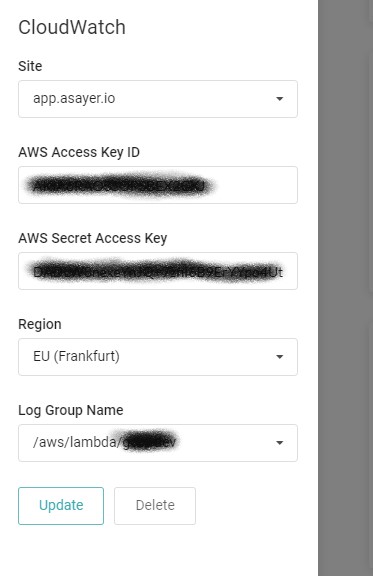CloudWatch
How to integrate CloudWatch with OpenReplay and see backend errors alongside session replays.
1. Create a Service Account
Section titled 1. Create a Service Account- Login to your AWS account.
- Go to IAM dashboard.
- Click on Users.
- Click on Add user button.
- Set the name to “openreplay_cw”.
- In access type, select Programmatic access.
- Click on Next: Permissions button.
- Choose Attach existing policies directly
- In the list of permissions, choose CloudWatchReadOnlyAccess.
- Click Next: Tags button.
- Click Next: Review button.
- Click Create user button.
- Copy the
Access key IDand theSecret access key.
2. Enable CloudWatch in OpenReplay
Section titled 2. Enable CloudWatch in OpenReplayPut your Access key ID and Secret access key in OpenReplay dashboard under ‘Preferences > Integration’, select the region and select the log group that you want to track from the dropdown list.

3. Propagate openReplaySessionToken
Section titled 3. Propagate openReplaySessionTokenTo link a CloudWatch event with the recorded user session, a unique token has to be propagated from your frontend to your backend on each request you want to track. This can be done using a custom HTTP header. In the below example, we use the fetch function to send that header.
const headers = {
Accept: 'application/json',
'Content-Type': 'application/json',
};
if (tracker.getSessionToken()) { // use window.OpenReplay instead of tracker if you're using the snippet
headers['X-OpenReplay-SessionToken'] = tracker.getSessionToken(); // Inject openReplaySessionToken
}
fetch('www.your-backend.com', {
'GET',
headers,
});In order for OpenReplay to associate a Cloudwatch log entry with the recorded user session, a unique token has to be propagated as part of each backend error you wish to track.
Below is an example in Python using Monkey Patching.
import sys
import traceback
#...
old_tb = traceback.print_exception
old_f = sys.stdout
old_e = sys.stderr
OPENREPLAY_SESSION_TOKEN = None
class F:
def write(self, x):
if OPENREPLAY_SESSION_TOKEN is not None and x != '\n':
old_f.write(f"[openReplaySessionToken={OPENREPLAY_SESSION_TOKEN}] {x}")
else:
old_f.write(x)
def flush(self):
pass
def tb_print_exception(etype, value, tb, limit=None, file=None, chain=True):
if OPENREPLAY_SESSION_TOKEN is not None:
value = type(value)(f"[openReplaySessionToken={OPENREPLAY_SESSION_TOKEN}] " + str(value))
old_tb(etype, value, tb, limit, file, chain)
traceback.print_exception = tb_print_exception
sys.stderr = F()The name of the tag openReplaySessionToken is case sensitive.
Have questions?
Section titled Have questions?If you encounter any issues, connect to our Slack or check out our Forum and get help from our community.